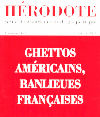Des banlieues françaises aux périphéries américaines : du mythe à l’impossible confrontation ?
Un sondage effectué au début des années 1990 montrait qu’à peine un Américain sur six pensait qu’il était du ressort de l’État de réduire les inégalités sociales alors que plus des trois quarts des Français interrogés considéraient que cela allait de soi. Dans ce texte, on se demandera si ces différences accordées aux valeurs fondamentales et à la représentation des exclusions ont des conséquences directes sur l’organisation des deux sociétés et, plus généralement, si les rapports complexes entretenus entre les deux États depuis la Déclaration d’indépendance américaine se traduisent dans les modalités du développement périphérique des agglomérations et dans l’urbanité des territoires nouvellement aménagés. Mais il va de soi que la validité des réponses impose un re-tour sur le vocabulaire et d’abord sur les mots qui ont orienté la lecture de la ville et de ses périphéries de part et d’autre de l’Atlantique.
Abstract : From French Suburbs to American Outskirts : from the Myth to the Impossible Confrontation ?
In the early nineties a survey was carried out and showed that one out of six Ameri-cans thought it was the State’s responsibility to reduce social inequalities, when three quarters of the French questioned answered it stood to reason. In this article, we’ll ask ourselves whether the differences based on fundamental values and on exclusion rep-resentations have direct consequences on the organization of both societies, and more globally, if the continuous complex ties between the two states since the American Declaration of Independence result in modalities of agglomerations’ suburban devel-opment of and in the of territories recently developed. But it is obvious that the valida-tion of the answers includes a return on the vocabulary and first of all on the words which oriented the reading of the city and its outskirts from both sides of the Atlantic.
Tweeter cet article Suivre @RevueHerodote sur TwitterL’institut Français de Géopolitique offre des formations de master intenses, exigeantes et passionnantes !
Hérodote est historiquement liée à la formation en géopolitique (master et doctorat) de l’Université Paris 8 — Vincennes - Saint-Denis, l’Institut Français de Géopolitique (IFG) où ont enseigné son fondateur Yves Lacoste, sa directrice Béatrice Giblin (également fondatrice de l’IFG), et une partie importante de l’équipe de la revue.
La première année est consacrée à la formation à et par la recherche, qui est au cœur du projet intellectuel et citoyen de l’École France de Géopolitique. Les étudiants et les étudiantes doivent écrire un mémoire de recherche d’une centaine de page appuyé sur une enquête de terrain d’un mois en autonomie. Un accompagnement fort leur est proposé pour favoriser leur réussite durant cette année si différente de leurs expériences précédentes.
En seconde année, quatre spécialisations professionnalisantes sont possibles : géopolitique locale et gouvernance territoriale, géopolitique du cyberespace, nouveaux territoires de la compétition stratégique, analyse des risques géopolitiques et environnementaux. Toutes ces spécialisations sont ouvertes à l’alternance, et la majorité des étudiants et des étudiantes a désormais un contrat d’apprentissage. Celles et ceux qui souhaitent faire une seconde année de recherche le peuvent, notamment en préparation d’un projet de doctorat.
Avec 85 places en première année, le master de l’IFG offre aussi une véritable vie collective de promo, animée notamment par une association étudiante dynamique. Les étudiantes et étudiants viennent de nombreuses formations et disciplines, notamment : géographie, d’histoire, de droit, de sociologie, de science-politique, Économie et gestion, langues (LLCE/LEA) ou de classes préparatoires.
Les candidatures en première année de master se font exclusivement via la plateforme nationale monmaster.gouv.fr du 26 février au 24 mars 2024. Toutes les informations utiles se trouvent sur le site www.geopolitique.net. En deuxième année, les candidatures doivent passer par le site de l’Université. L’IFG n’offre pas de formation au niveau licence.










